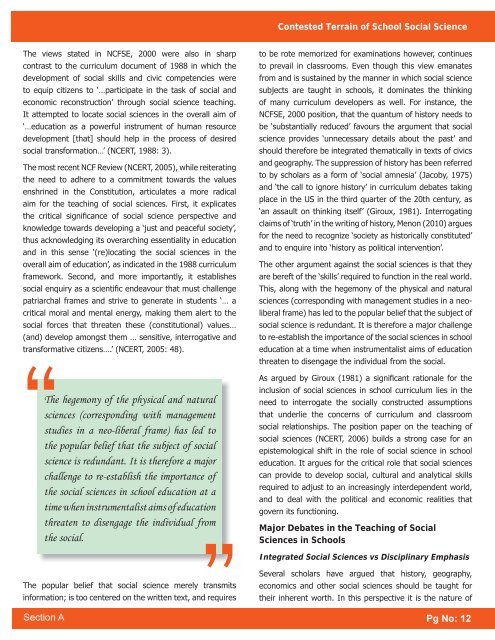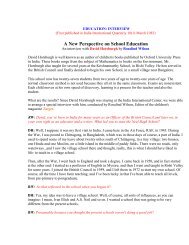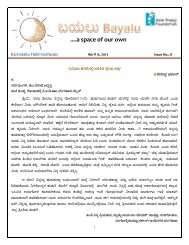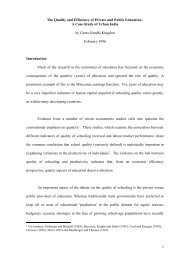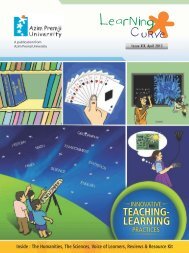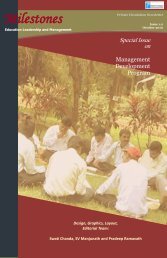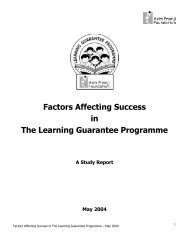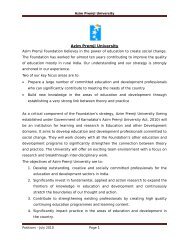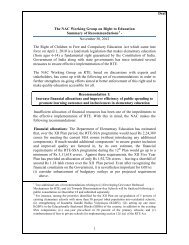Indesign Pagesnew.indd - Azim Premji Foundation
Indesign Pagesnew.indd - Azim Premji Foundation
Indesign Pagesnew.indd - Azim Premji Foundation
Create successful ePaper yourself
Turn your PDF publications into a flip-book with our unique Google optimized e-Paper software.
The views stated in NCFSE, 2000 were also in sharp<br />
contrast to the curriculum document of 1988 in which the<br />
development of social skills and civic competencies were<br />
to equip citizens to ‘…participate in the task of social and<br />
economic reconstruction’ through social science teaching.<br />
It attempted to locate social sciences in the overall aim of<br />
‘…education as a powerful instrument of human resource<br />
development [that] should help in the process of desired<br />
social transformation…’ (NCERT, 1988: 3).<br />
The most recent NCF Review (NCERT, 2005), while reiterating<br />
the need to adhere to a commitment towards the values<br />
enshrined in the Constitution, articulates a more radical<br />
aim for the teaching of social sciences. First, it explicates<br />
the critical signifi cance of social science perspective and<br />
knowledge towards developing a ‘just and peaceful society’,<br />
thus acknowledging its overarching essentiality in education<br />
and in this sense ‘(re)locating the social sciences in the<br />
overall aim of education’, as indicated in the 1988 curriculum<br />
framework. Second, and more importantly, it establishes<br />
social enquiry as a scientifi c endeavour that must challenge<br />
patriarchal frames and strive to generate in students ‘… a<br />
critical moral and mental energy, making them alert to the<br />
social forces that threaten these (constitutional) values…<br />
(and) develop amongst them … sensitive, interrogative and<br />
transformative citizens….’ (NCERT, 2005: 48).<br />
The hegemony of the physical and natural<br />
sciences (corresponding with management<br />
studies in a neo-liberal frame) has led to<br />
the popular belief that the subject of social<br />
science is redundant. It is therefore a major<br />
challenge to re-establish the importance of<br />
the social sciences in school education at a<br />
time when instrumentalist aims of education<br />
threaten to disengage the individual from<br />
the social.<br />
The popular belief that social science merely transmits<br />
information; is too centered on the written text, and requires<br />
Section A<br />
Contested Terrain of School Social Science<br />
to be rote memorized for examinations however, continues<br />
to prevail in classrooms. Even though this view emanates<br />
from and is sustained by the manner in which social science<br />
subjects are taught in schools, it dominates the thinking<br />
of many curriculum developers as well. For instance, the<br />
NCFSE, 2000 position, that the quantum of history needs to<br />
be ‘substantially reduced’ favours the argument that social<br />
science provides ‘unnecessary details about the past’ and<br />
should therefore be integrated thematically in texts of civics<br />
and geography. The suppression of history has been referred<br />
to by scholars as a form of ‘social amnesia’ (Jacoby, 1975)<br />
and ‘the call to ignore history’ in curriculum debates taking<br />
place in the US in the third quarter of the 20th century, as<br />
‘an assault on thinking itself’ (Giroux, 1981). Interrogating<br />
claims of ‘truth’ in the writing of history, Menon (2010) argues<br />
for the need to recognize ‘society as historically constituted’<br />
and to enquire into ‘history as political intervention’.<br />
The other argument against the social sciences is that they<br />
are bereft of the ‘skills’ required to function in the real world.<br />
This, along with the hegemony of the physical and natural<br />
sciences (corresponding with management studies in a neoliberal<br />
frame) has led to the popular belief that the subject of<br />
social science is redundant. It is therefore a major challenge<br />
to re-establish the importance of the social sciences in school<br />
education at a time when instrumentalist aims of education<br />
threaten to disengage the individual from the social.<br />
As argued by Giroux (1981) a signifi cant rationale for the<br />
inclusion of social sciences in school curriculum lies in the<br />
need to interrogate the socially constructed assumptions<br />
that underlie the concerns of curriculum and classroom<br />
social relationships. The position paper on the teaching of<br />
social sciences (NCERT, 2006) builds a strong case for an<br />
epistemological shift in the role of social science in school<br />
education. It argues for the critical role that social sciences<br />
can provide to develop social, cultural and analytical skills<br />
required to adjust to an increasingly interdependent world,<br />
and to deal with the political and economic realities that<br />
govern its functioning.<br />
Major Debates in the Teaching of Social<br />
Sciences in Schools<br />
Integrated Social Sciences vs Disciplinary Emphasis<br />
Several scholars have argued that history, geography,<br />
economics and other social sciences should be taught for<br />
their inherent worth. In this perspective it is the nature of<br />
Pg No: 12


